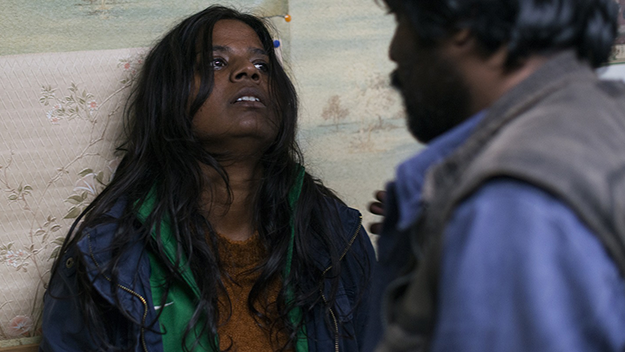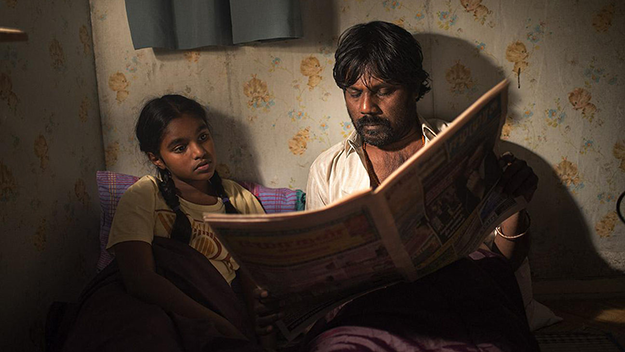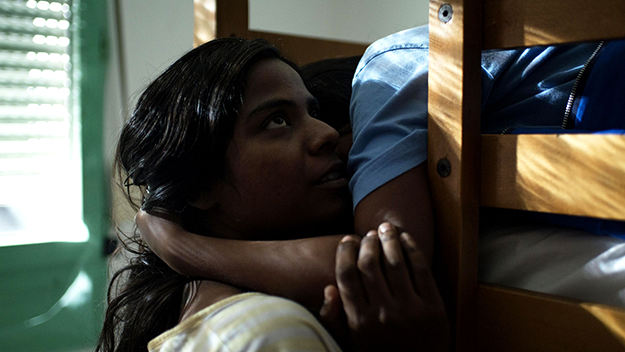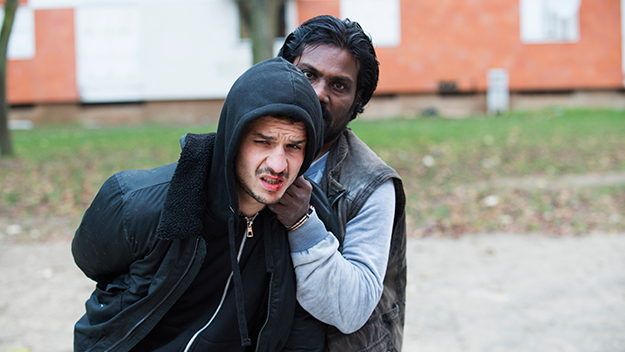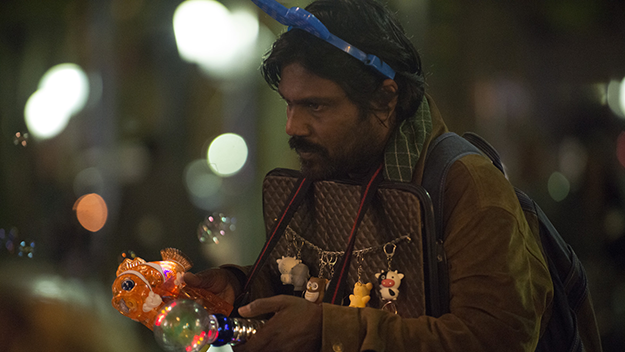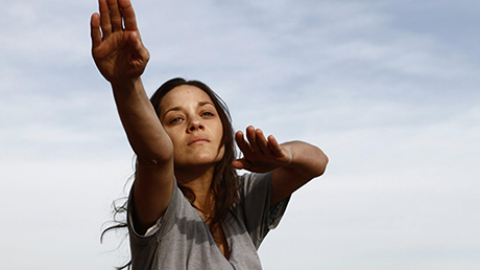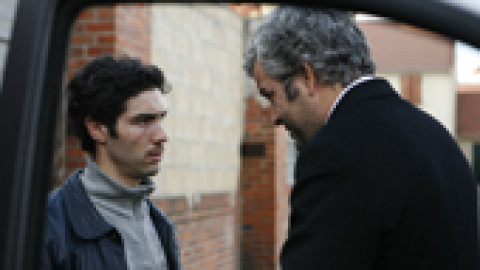Film of the Week: Dheepan
In any year other than 2015, I’d have been, say, 75 percent in agreement with the decision to award the Cannes Palme d’Or to Jacques Audiard’s Dheepan. If the extraordinary Son of Saul hadn’t been in competition, then yes, Dheepan would have been one of a very few credible candidates. Dheepan is nearly a superb film, but its flaws are no easier to overlook a year after its premiere.
Nevertheless, Dheepan is a pretty good Jacques Audiard film, and certainly a very ambitious one. It has a strong imaginative agenda, in the sense that Audiard is a director who likes to conjure up the idea of a specific real, or at least realistic, environment (the prison of A Prophet, the unglamorous hinterlands of the South of France in Rust and Bone) and explore it in vivid, immersive detail. Dheepan also has a strong social and ethical agenda; as in A Prophet (09), about a disenfranchised young Arab in the prison system, and as in Read My Lips (01), about a young deaf woman in a male world, he wants to take us into the souls of social outsiders, the chronically unrepresented. In Dheepan, the central characters are three Sri Lankan refugees living in France as a family, although they’re actually strangers. The film’s radical tactic, given that it’s a prestigious, relatively commercial French mainstream movie, is that its lead actors are total unknowns from the Indian subcontinent and that the dialogue is predominantly in Tamil.
The film begins in 2009, at the end of the Sri Lankan civil war, with the rebel militia movement, the Tamil Tigers, facing defeat by government forces. We see a Tiger militant, played by Antonythasan Jesuthasan, presiding over a funeral pyre for his defeated comrades. Then a woman named Yalini (Kalieaswari Srinivasan) searches through crowds of displaced people for a girl without parents, to use the girl as her passport out of the country. The ploy works: Yalini finds herself posing as a married couple with the soldier, who takes the name Dheepan, with Illayaal (played by a commandingly confident 9-year-old, Claudine Vinasithamby) stepping into her role as their ready-made “daughter.”
They soon end up in France, but life isn’t easy: Dheepan finds himself in the typical situation of an exploited immigrant, with a fly-by-night job selling worthless novelties around Paris cafés. In one bizarre shot, Dheepan looms out of soft-focus darkness as a strange glow of fairy light (the film is remarkably shot, with an eye for both poetry and harsh grubbiness, by neophyte DP Éponine Momenceau); as he approaches, we realize he’s wearing a preposterous set of glowing Mickey Mouse ears. It’s one of those typical moments in an Audiard film where realism cedes the way to striking imagery: this, perhaps, is the “Audiard touch.” It’s neat shorthand for the indignity that Dheepan must endure, but it’s also a stylistic flourish that feels obtrusive and unnecessarily indulgent, as if the ears weren’t bad enough and had to be pushed to yield spurious surrealism. Just as dubious is the repeated image of thick jungle foliage that haunts Dheepan’s dreams, with an elephant’s eye and Rorschach-blotted skin emerging. It seems plausible that Dheepan would be haunted by memories of the old country, but dreams of elephants? This feels like an egregious lapse into exoticism.
It’s a rare instance, however. The film soon settles into a more hard-headed form of borderline-Loachian realism. When Dheepan claims he was a peace activist, the translator in a meeting with French social services claims he’s heard it all before: the telling touch in this scene has the family and the Tamil interpreter talk among themselves about what’s really going on, while the French bureaucrat looks on in mystification. Linguistic incomprehension is a steep wall that immigrants must learn to scale, but it can also be a protecting shield.
The “family” gets assigned to a housing estate on the outskirts of Paris, a nice-enough-sounding place—after all, it has Le Pré (“the field”) in its name. In reality, it’s a brutally disadvantaged slum, run by a local drug gang—essentially a French equivalent of the Baltimore projects of The Wire. Dheepan has a post there as a caretaker, but the lines are drawn by the gangs; he can look after certain blocks, but everywhere else is no-go. Meanwhile, Yalini gets a job looking after an elderly Arab man, who turns out to be the father of Brahim, the local gang boss. Brahim is played by Vincent Rottiers; this fine young actor always brings a compelling touch of intensity to a film, and Audiard has said he felt that casting a non-Arab actor in this role would be fruitfully counterintuitive. Rottiers’s Brahim is charismatically snake-like and vulnerable, clearly dangerous for all his charm—and yet his resemblance to Edward Norton, never entirely plausible as a hard man, is disconcerting, a case of sore thumb to say the least.
Through all of this, Yalini and Dheepan are getting used to each other—and to the demands of being parents to a child they don’t know. This “false family” theme is the richest and most successful strand of Dheepan. Adults and child alike are doing their best to play their parts—but Illayaal urgently needs parents who are prepared to be real. The intelligent twist the film brings to their family dynamic is that it’s the ostensibly hard, distant male warrior who acclimatizes best to parenthood, with Dheepan naturally adept at comforting Illayaal. Her “mother,” however, can barely do it: when Yalini drops her off at the school gates, the girl asks for at least a show of parental love: “Give me a kiss like everybody else.” The film very compellingly becomes, in a sense, the story of Yalini’s adjusting to motherhood—and eventually, her dawning interest in making a real connection with Dheepan.
If Audiard had wanted, Dheepan could have been a much softer, more directly emotive drama about the difficulties of being an immigrant in an inhospitable, unfamiliar world. Or it could have been entirely about Yalini’s emotional journey. Given the absolutely compelling, quiet but richly nuanced performance by Srinivasan—a professional stage actress from Chennai, India—you can imagine it being a thoroughly satisfying film in just those terms.
Of course, it’s a much more ambitious film, in the sense that Audiard and his co-writers, Thomas Bidegain and Noé Debré have a lot to cram in. One thing they want is a crime story, which seems somehow inevitable because Audiard is by natural inclination a crime director, and the further his films stray from genre, the less focused they feel (which is no doubt why Rust and Bone didn’t entirely cohere). The gang war background to Dheepan isn’t entirely a problem, because it’s sketched out fairly convincingly, with such details as the information that the gang’s foot soldiers are brought in from distant estates, since emotional ties with the local community would complicate their jobs. When Yalini becomes sick of the escalating violence on the estate, she asks Dheepan: “Doesn’t it remind you of something?” It’s different here, he says. She retorts: “Because you did the shooting there?”
Against this background, Dheepan’s own personal mission is to settle in and do his job well: his decisive gesture is to make himself a tool box. Played by the serious, contained Jesuthasan (a nonprofessional actor who’s himself a former Tiger turned émigré novelist), Dheepan is a calm, focused man who can wade into action and fix a long-dead elevator—one step on his path to becoming the peacemaking sheriff of this banlieue Tombstone. Meanwhile, Yalini forms a tentative bond—partly a matter of curiosity, partly (it’s suggested) an erotic attraction—with Brahim, who’s happy to have her around his dad’s apartment to talk to, even if he thinks she can’t understand a word he’s saying. He certainly can’t understand her as she talks about her life in Tamil, smiling mysteriously at him—even as she explains that, culturally, smiling even when you’re sad is simply what people do in her country. Exoticism and elephants apart, Dheepan very convincingly makes us see a strange world from the point of view of its newcomer characters, in a way that’s both unpatronizing and unglamorizing.
Narratively, through, the film skates on the edge of incoherence. The film never much cares about the risk of the family’s imposture being detected—which certainly saves it from obviousness—yet it makes a mess of the suggestion that Dheepan’s past might be coming back to haunt him. A colonel from the old country wants to get Dheepan involved in an arms-running scheme, but Dheepan demurs and goes home to angrily sing the Tigers’ battle song; then this thread is basically dropped, although the guns aren’t. The film’s big flaw emerges 20 minutes before the end, when what had been a low-key realist drama suddenly erupts into a vigilante thriller, with Dheepan as a machete-toting action hero, wading through smoke-filled chaos. When I interviewed Audiard a couple of months ago, he was downright horrified by my suggestion that Dheepan had turned into a sort of Charles Bronson; he was thinking more along Travis Bickle lines. Either way, the film hasn’t remotely prepared us for this moment; it’s as if Audiard has jettisoned 20 pages of script to cut to the climax. The coda that follows is even more of a wrench: an utterly phony vision of a leafy suburban haven with family and a multiethnic circle of friends. In a London Q&A I conducted with Audiard and Bidegain last October, the filmmakers argued that if the ending seems unreal, it’s because they wanted it to seem like a dream. But there’s nothing in the film to suggest that it is anything but entirely real, and entirely botched.
So 75 percent seems a decent mark for what could have been a great film—and remains formidable, despite its major flaws. I don’t buy the objections made by Caspar Salmon in a recent Guardian piece, who accuses the film of “demagoguery” and being “ultimately irresponsible and politically dangerous” in that it “burden[s] the underprivileged with the stigma of lawlessness.” Salmon argues that Dheepan’s representation of banlieue gang activity and gun crime are utterly unfounded in any reality; fair enough, but the true interest of Dheepan lies in the contrast between the fantasy element that makes it a genre movie and the substantial quotient of social and emotional verisimilitude that makes the family’s story so engaging. It’s only at the end that Dheepan falls apart, frustratingly and spectacularly.
But it wouldn’t be fair to attribute too much intellectual complexity to what is, at heart, an honest attempt to buck the trend of making more bourgeois white French films about bourgeois white French people. When I interviewed Audiard, he commented on Dheepan’s characters: “We see migrants as people who have no faces and no names, no identity, no unconscious, no dreams. And what happens to all the violence they’ve been through? I wanted to give them a name, a face, a shape—and give them a violence of their own. It’s a naïve film, really.” Dheepan arguably is a naïve film, albeit a powerful and in many ways satisfying one, and among naïve (or would-be naïve) directors, Audiard is one of the smartest. But Dheepan is finally also a clumsy film that willfully gives up on all the things that make it work, and that’s hard to forgive.
Jonathan Romney is a contributing editor to FILM COMMENT and writes its Film of the Week column. He is a member of the London Film Critics Circle.



